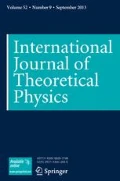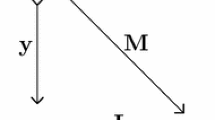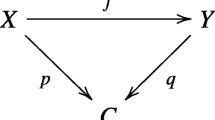Abstract
In this paper we present a new categorical approach which attempts to provide an original understanding of QM. Our logos categorical approach attempts to consider the main features of the quantum formalism as the standpoint to develop a conceptual representation that explains what the theory is really talking about —rather than as problems that need to be bypassed in order to allow a restoration of a classical “common sense” understanding of what there is. In particular, we discuss a solution to Kochen-Specker contextuality through the generalization of the meaning of global valuation. This idea has been already addressed by the so called topos approach to QM —originally proposed by Isham, Butterfiled and Döring— in terms of sieve-valued valuations. The logos approach to QM presents a different solution in terms of the notion of intensive valuation. This new solution stresses an ontological (rather than epistemic) reading of the quantum formalism and the need to restore an objective (rather than classical) conceptual representation and understanding of quantum physical reality.
Similar content being viewed by others
Notes
For a detailed analysis and discussion of the relation between conceptual representation, mathematical structures and measurement outcomes see [18].
We use the term ‘ontic’ to make clear the distance with respect to the ‘epistemic’ views. See for a detailed discussion [17, 18]. As it has been remarked by van Fraassen, while the question of the ontological (or metaphysical) interpretation of a theory is something of main importance for the realist, for the empiricist this question is one of relative concern. He says [58, p. 242] that an ontological interpretation responds to the questions of “what would it be like for this theory to be true, and how could the world possibly be the way this theory says it is?”
For example Mermin states in [56, p. 3375] that: “The strengthening of Bell’s example by GHZ and the demonstration that GHZ also works as a KS theorem should liberate future generations of students of the foundations of quantum mechanics from having to cope with the geometrical intricacies of the original KS argument.”
The idea of a contextual or partial truth valuation has been recently formalized by Karakostas and Zafiris [52, 53]. Our approach goes in line with the development of a potential truth as discussed in [22]. The analysis of this specific subject exceeds the scope of this paper and will be left for a future work.
A similar definition is discussed in [51].
This is what is called following the “minimal interpretation” a quantum state. For a detailed analysis of the notion of quantum state in the topos approach see [39].
We avoid using the term “quantum state” for reasons that will become clear in the following.
I am thankful to Bob Coecke for this linguistic insight. Cagliari, July 2014.
The fact that even in classical physics we can find epistemically incompatible measurement situations has been discussed by Diederik Aerts in [3].
References
Abramsky, S., Coecke, B.: Categorical Quantum Mechanics Handbook of Quantum Logic and Quantum Structures, vol. II. Elsevier, Amsterdam (2008)
Adámek J., Herrlich, H.: Cartesian closed categories, quasitopoi and topological universes. Comment. Math. Univ. Carol. 27, 235–257 (1986)
Aerts, D.: Description of many physical entities without the paradoxes encountered in quantum mechanics. Found. Phys. 12, 1131–1170 (1982)
Aerts, D., Sassoli di Bianchi, M.: Do spins have directions?. Soft. Comput. 21, 1483–1504 (2017)
Angot-Pellissier, R.: The Relation Between Logic, Set Theory and Topos Theory as It Is Used by Alain Badiou. In: Koslow, A., Buchsbaum, A. (eds.) The Road to Universal Logic, pp. 181–200. Springer, Switzerland (2015)
Bacciagaluppi, G.: Did Bohr understand EPR?, preprint. arXiv:philsci-archive.pitt.edu/11023/ (2014)
Bell, J.S.: Bell, Speakable and Unspeakable in Quantum Mechanics. Cambridge University Press, Cambridge (1987)
Birkhoff, G., Von Neumann, J.: The logic of quantum mechanics. Ann. Math. 37, 823–843 (1936)
Bohr, N.: The Quantum of Action and the Description of Nature. In: Rüdinger, E. (ed.) Collected Works, pp. 208–217, North-Holland (1985)
Bohr, N.: Can Quantum Mechanical Description of Physical Reality be Considered Complete?. Phys. Rev. 48, 696–702 (1935)
Bokulich, P., Bokulich, A.: Niels bohr’s generalization of classical mechanics. Found. Phys. 35, 347–371 (2005)
Born, M.: Physical reality”. Philos. Q. 3, 139–149 (1953)
Butterfild, J., 2017: interview: Jeremy Butterfield: What is contextuality?, (published 3rd of March, 2017) https://www.youtube.com/watch?v=ZJAnixX8T4U
Cabello, A., Estebaranz, J.M., García-alcaine, G.: Bell-Kochen-Specker theorem: a proof with 18 vectors. Phys. Lett. A 212, 183–187 (1996)
Coecke, B., Kissinger, A.: Picturing Quantum Processes. Cambridge University Press, Cambridge (2017)
de Ronde, C.: Probabilistic Knowledge as Objective Knowledge in Quantum Mechanics: Potential Immanent Powers instead of Actual Properties. In: Aerts, D., de Ronde, C., Freytes, H., Giuntini, R. (eds.) Probing the Meaning of Quantum Mechanics: Superpositions, Semantics, Dynamics and Identity, pp. 141–178. World Scientific, Singapore (2016)
de Ronde, C.: Representational Realism, Closed Theories and the Quantum to Classical Limit. In: Kastner, R. E., Jeknic-Dugic, J., Jaroszkiewicz, G. (eds.) Quantum Structural Studies, pp. 105–135. World Scientific, Singapore (2016)
de Ronde, C.: Quantum Superpositions and the Representation of Physical Reality Beyond Measurement Outcomes and Mathematical Structures, Foundations of Science, https://doi.org/10.1007/s10699-017-9541-z. arXiv:quant-ph/arXive:1603.06112 (2017)
de Ronde, C.: Unscrambling the Omelette of Quantum Contextuality: Preexistent Properties or Measurement Outcomes?, Foundations of Science, forthcoming. arXiv:quant-ph/arXive:1606.03967 (2018)
de Ronde, C.: Immanent Powers versus Causal Powers (Propensities, Latencies and Dispositions) in Quantum Mechanics. In: Aerts, D., Dalla Chiara, M.L., de Ronde, C., Krause, D. (eds.) Probing the Meaning of Quantum Mechanics. arXiv:quant-ph/arXive:1711.02997. World Scientific, Singapore (2018)
de Ronde, C.: Causality and the Modeling of the Measurement Process in Quantum Theory. Disputatio, forthcoming (2018)
de Ronde, C.: Potential Truth in Quantum Mechanics, preprint (2018)
de Ronde, C., Freytes, H., Domenech, G.: Interpreting the modal Kochen-Specker theorem: Possibility and many worlds in quantum mechanics. Stud. Hist. Philos. Mod. Phys. 45, 11–18 (2014)
de Ronde, C., Massri, C.: Kochen-Specker Theorem, physical invariance and quantum individuality. Cad. Filos. Cienc. 2, 107–130 (2017)
de Ronde, C., Massri, C.: The Logos Categorical Approach to Quantum Mechanics: II. Quantum Superpositions., sent (2018)
Dorato, M.: Events and the ontology of quantum mechanics. Topoi 34, 369–378 (2015)
Döring, A., Isham, C.J.: A Topos Foundation for Theories of Physics 1: Formal languages for Physics. J. Math. Phys. 49, 053515 (2008)
Döring, A., Isham, C.J.: Classical and quantum probabilities as truth values. J. Math. Phys. 53, 032101 (2011)
Döring, A., Isham, C.J.: ‘What is a Thing?’: Topos Theory in the Foundations of Physics. In: Coecke, B. (ed.) New Structures for Physics, pp. 753–940. Springer, Berlin (2011)
Döring, A., Barbosa, R.: Unsharp Values, Domains and Topoi. In: Finster, F., Müller, O., Nardmann, M., Tolksdorf, J., Zeidler, E. (eds.) Quantum Field Theory and Gravity, pp. 65–96. Springer, Berlin (2012)
Domenech, G., Freytes, H.: Contextual logic for quantum systems. J. Math. Phys. 46, 012102–1-012102-9 (2005)
Domenech, G., Freytes, H., de Ronde, C.: Scopes and limits of modality in quantum mechanics. Ann. Phys. 15, 853–860 (2006)
Domenech, G., Freytes, H., de Ronde, C.: A topological study of contextuality and modality in quantum mechanics. Int. J. Theor. Phys. 47, 168–174 (2008)
Domenech, G., Freytes, H., de Ronde, C.: Modal-type orthomodular logic. Math. Log. Q. 3, 307–319 (2009)
Domenech, G., Freytes, H., de Ronde, C.: Many worlds and modality in the interpretation of quantum mechanics: an algebraic approach. J. Math. Phys. 50, 072108 (2009)
Diestel, R.: Graph Theory. Springer, Heidelberg (2010)
Einstein, A., Podolsky, B., Rosen, N.: Can Quantum-Mechanical Description be Considered Complete?. Phys. Rev. 47, 777–780 (1935)
Eva, B.: Modality and contextuality in topos quantum theory. Stud. Log. 104, 1099–1118 (2016)
Eva, B.: Topos theoretic quantum realism, British Journal for the Philosophy of Science, forthcoming. arXiv:philsci-archive:11982 (2016)
Freyd, P., Scedrov, A.: Categories Allegories. North-Holland Publishing Co., Amsterdam (1990)
Fuchs, C.A., Peres, A.: Quantum theory needs no ‘interpretation’. Phys. Today 53, 70–71 (2000)
Gleason, A.: Measures on the closed subspaces of a Hilbert space. J. Math. Mech. 6, 885–893 (1957)
Hawthorne, J.: A Metaphysician Looks at the Everett Interpretation. In: Saunders, S., Barrett, J., Kent, A., Wallace, D. (eds.) Many Worlds?, pp. 144–153. Oxford University Press, Oxford (2009)
Heisenberg, W.: Physics and Beyond. Harper & Row, New York (1971)
Howard, D.: What Makes a Classical Concept Classical? Toward a Reconstruction of Niels Bohr’s Philosophy of Physics. In: Niels Bohr and Contemporary Philosophy. Vol. 158 of Boston Studies in the Philosophy of Science, pp. 201–229. Kluwer, Dordrecht (1994)
Isham, C.J.: Topos Theory and Consistent Histories: The Internal Logic of the Set of all Consistent Sets. Int. J. Theor. Phys. 36, 785–814 (1997)
Isham, C.J., Butterfield, J.: A topos perspective on the Kochen- Specker theorem: I. Quantum states as generalised valuations. Int. J. Theor. Phys. 37, 2669–2733 (1998)
Isham, C.J., Butterfield, J.: A topos perspective on the Kochen-Specker theorem: II. Conceptual aspects, and classical analogues. Int. J. Theor. Phys. 38, 827–859 (1999)
Isham, C.J., Butterfield, J.: A topos perspective on the Kochen-Specker theorem: III. Von Neumann algebras as the base category. Int. J. Theor. Phys. 39, 1413–1436 (2000)
Isham, C.J., Butterfield, J.: A topos perspective on the Kochen-Specker theorem: IV. Interval valuations. Int. J. Theor. Phys. 41, 613–639 (2002)
Kalmbach, G.: Quantum Measures and Spaces. Kluwer Academic Publishers, Dordrecht (1998)
Karakostas, V.: Correspondence truth and quantum mechanics. Axiomathes 24, 343–358 (2014)
Karakostas, V., Zafiris, E.: On the Notion of Truth in Quantum Mechanics: A Category-Theoretic Standpoint. In: Aerts, D., de Ronde, C., Freytes, H., Giuntini, R. (eds.) Probing the Meaning of Quantum Mechanics: Superpositions, Semantics, Dynamics and Identity, pp. 1–43. World Scientific, Singapore (2016)
Kochen, S., Specker, E.: On The problem of Hidden Variables in Quantum Mechanics. J. Math. Mech. 17, 59–87 (1967). Reprinted in Hooker, 1975, 293–328
Mac Lane, S.: Categories for the Working Mathematician. Springer-Verlag, New York (1998)
Mermin, D.: Extreme quantum entanglement in a superposition of macroscopically distinct states. Phys. Rev. Lett. 65, 1838–1840 (1990)
Schrödinger, E.: The Present Situation in Quantum Mechanics. Naturwiss 23, 807 (1935). Translated to english in Quantum Theory and Measurement, Wheeler, J. A., Zurek, W. H. (Eds.), 1983, Princeton University Press, Princeton
Van Fraassen, B.: Quantum Mechanics: an Empiricist View. Oxford University Press, Oxford (1991)
Weyl, H.: Philosophy of Mathematics and Natural Science. Princeton University Press, Princeton (1949)
Acknowledgments
This work was partially supported by the following grants: FWO project G.0405.08 and FWO-research community W0.030.06. CONICET RES. 4541-12 and the Project PIO-CONICET-UNAJ (15520150100008CO) “Quantum Superpositions in Quantum Information Processing”.
Author information
Authors and Affiliations
Corresponding author
Rights and permissions
About this article
Cite this article
de Ronde, C., Massri, C. The Logos Categorical Approach to Quantum Mechanics: I. Kochen-Specker Contextuality and Global Intensive Valuations. Int J Theor Phys 60, 429–456 (2021). https://doi.org/10.1007/s10773-018-3914-0
Received:
Accepted:
Published:
Issue Date:
DOI: https://doi.org/10.1007/s10773-018-3914-0




